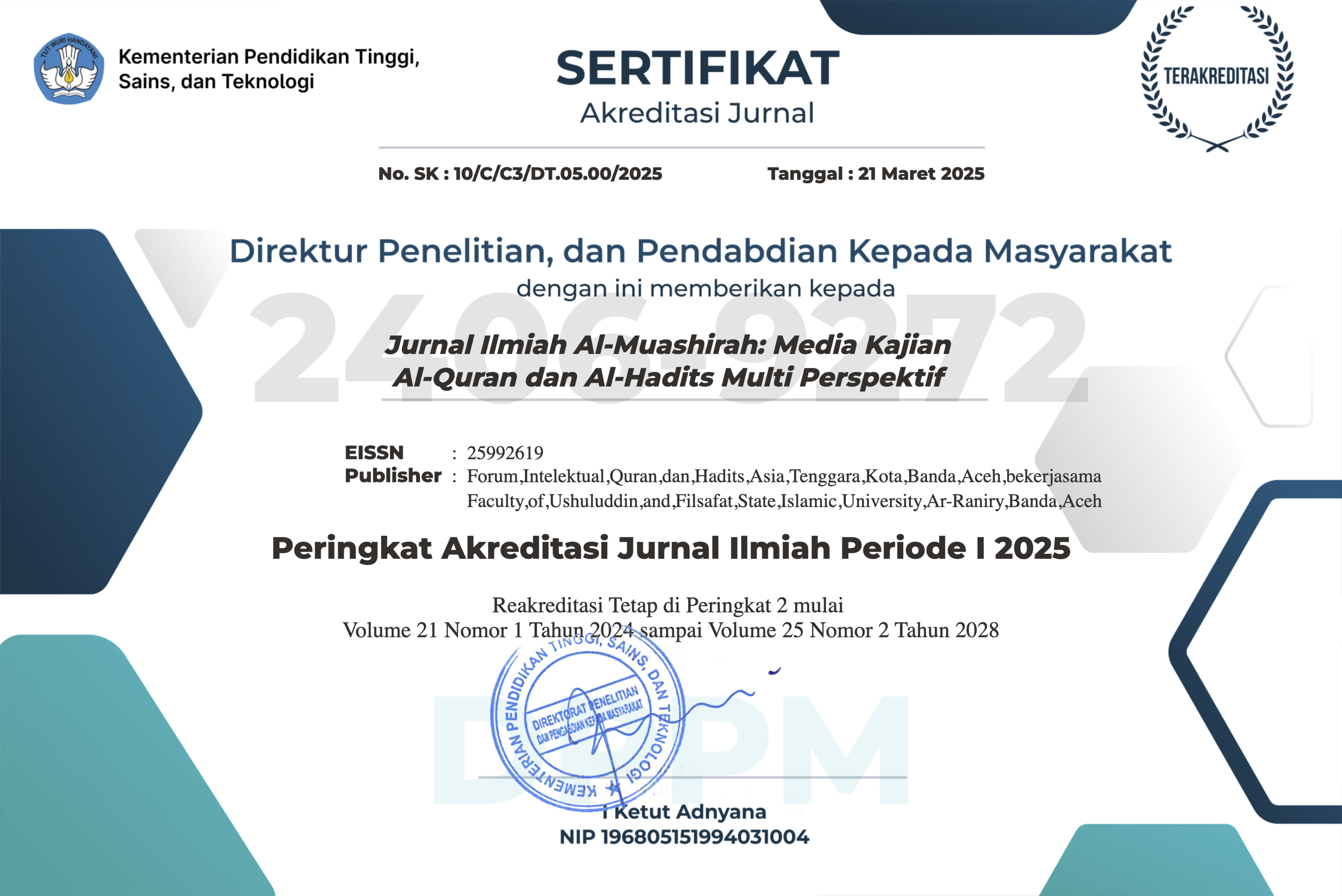Sifat-Sifat Da'i Dalam Al-Qur'an (Kajian Surah Ali' Imran Ayat 159)
DOI:
https://doi.org/10.22373/jim.v17i1.7910Keywords:
Dai, Honey, Alquran, Surah Ali ImranAbstract
Da‟i is a figure who should have good qualities because he is a role model for mad'u. This research is a library research, qualitative approach and content analysis method. Researchers determine QS. Ali Imran 3: 159 as the object of study. This verse describes the praiseworthy qualities of the Prophet Muhammad. when facing friends in the Uhud war. In a precarious situation the Prophet remained gentle, forgiving, had a strong determination and put his trust in Allah SWT. The da'i should be able to imitate the nature of the Prophet as described in the verse.
Downloads
References
Markama, “Komunikasi Dakwah Efektif dalam Perspektif Alquran”, Hunafa: Jurnal Studia Islamika,Vol. 11, No 1, (Juni 2014
Abdul Ghoni, “Konsep Tawakal dan Relevansinya dengan Tujuan Pendidikan Islam: Studi Komparasi Mengenai Konsep Tawakal menurut
M. Quraish Sihab dan Yunan Nasution”, Jurnal An-Nuha, Vol. 3, No.1, hal. 11
Abdulkhaliq, Jalan Dakwah, t.tp: Citra Press, 1996
Burhan Bungin, Analisis Data Penelitian Kualitatif, Jakarta: RajaGrafindo, 2003
Hamka, Tafsir al- Azhar, jilid 2, Cet. ke- 5, Singapura: Pustaka Nasional, 2003
______, Tasawuf Modern, Jakarta: Pustaka Panji Mas, 2013
Hanif M. Dahlan, “Komunikasi lemah Lembut dalam Studi Hadits”, Jurnal
At-Tanzir: Jurnal Prodi Komunikasi dan Penyiaran Islam, Vol. 11, No. 1,
Juni 2020
Ibnu Ahmad al-Ansari al-Qurtubi, al-Jami‟ul Ahkam al-Quran, , Juz V, Cet. ke-4, Beirut: Darul Hud
Icol Dianto, Analisis Tematik Subjek dakwah dalam Alquran, TADBIR: Jurnal Manajemen dakwah,Volume 1 Nomor 1, Juni 2019
Imam Nawawi, syarah Shahih Muslim, Juz 4, Kairo: Maktabah shafa, 2003
Kementerian Agama RI, Alquran dan Terjemahnya, Madinah Munawwarah:
Yayasan Penyelenggara Penterjemah/Pentafsir Alquran, T.th
M. Quraish Shihab, Secercah Cahaya Ilahi, Bandung: Pustaka Mizan, 2007
______, Tafsir al- Mishbah: Pesan, Kesan dan Keserasian al- Quran, Vol. 2, Cet.
ke- 8, Jakarta: Lentera hati, 2007
Moh. Nazir, Metode Penelitian, Jakarta: Ghalia Indonesia, 1988
Mohd. Ali Aziz, Ilmu Dakwah, Jakarta: Prenada Media, 2004
Nur Ahmad, “Tantangan Dakwah di Era Teknologi dan Informasi: Formulasi Karakteristik, Popularitas, dan Materi di Jalan Allah, Jurnal Addin, Vol. 8,No. 2, Agustus 2014
Samsul Munir Amin, Ilmu Dakwah, cet. ke-2, Jakarta: AMZAH, 2013
Yulidar Cut Mutia Yanti, “Psikologi Komunikasi dalam Meningkatkan dakwah Da‟i di Masjid Fajar Ikhlas Kelurahan Sumberejo Kecamatan Kemiling”, Jurnal Al-Adyan, Vol. 12, No. 2, Juli-Desember 2017
Yusi Amdani dan Liza Agnesta Krisna, “Konsep Meminta Maaf sebagai Hukum dalam Perkara Pidana”, Jurnal Hukum IUS QUIA IUSTUM, No. 1, Vol.26, Januari 2019
Zaini Sahara, “Kontribusi Gaya Kepemimpinan Transformasional dan Tekad
Profesional Kepala Madrasah terhadap Motivasi Kerja guru di MTsN2
Medan”, Thesis, Medan: UINSU, 2019
Downloads
Published
Issue
Section
License
Authors who publish in Jurnal Ilmiah Al-Mu'ashirah agree to the following terms:
- Authors retain copyright and grant the journal right of first publication with the work simultaneously licensed under a Attribution-ShareAlike 4.0 International (CC BY-SA 4.0) License that allows others to share the work with an acknowledgment of the work's authorship and initial publication in this journal.
- Authors are able to enter into separate, additional contractual arrangements for the non-exclusive distribution of the journal's published version of the work (e.g., post it to an institutional repository or publish it in a book), with an acknowledgment of its initial publication in this journal.
- Authors are permitted and encouraged to post their work online (e.g., in institutional repositories or on their website) prior to and during the submission process, as it can lead to productive exchanges, as well as earlier and greater citation of published work (See The Effect of Open Access).













